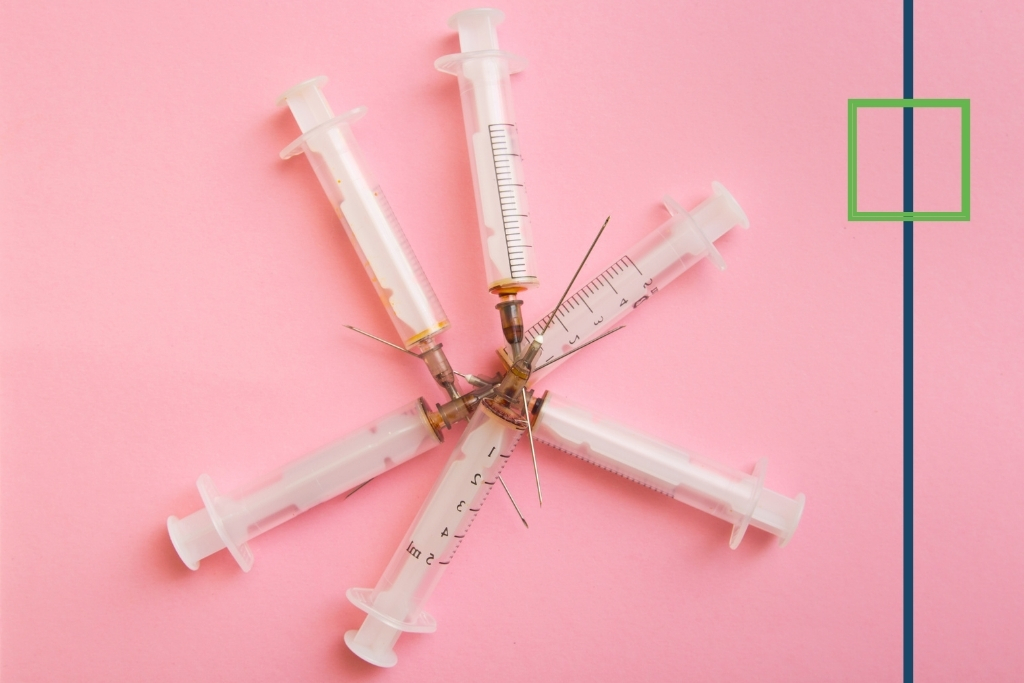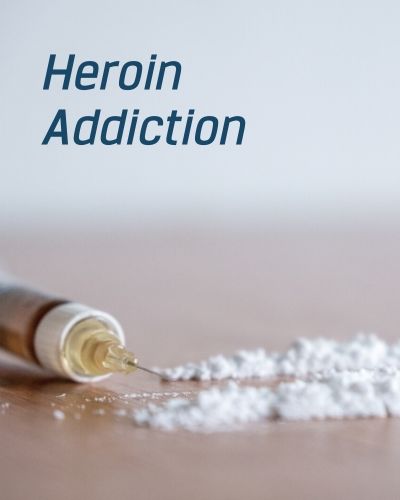What is Heroin?
Heroin is an opioid drug made from morphine, a natural substance taken from the seed pod of the various opium poppy plants grown in Southeast and Southwest Asia, Mexico, and Colombia [1]. Heroin can be a white or brown powder, or a black sticky substance known as black tar heroin. People sniff, inject, snort, or smoke heroin. Some people mix heroin with crack cocaine, a practice called speedballing. Heroin enters the brain rapidly and binds to opioid receptors on cells located in many areas, especially those involved in feelings of pain and pleasure and in controlling heart rate, sleeping, and breathing.
Heroin is addictive and there is a high risk of drug overdose and death from using it. Heroin also often contains additives, such as sugar, starch, or powdered milk, that can clog blood vessels leading to the lungs, liver, kidneys, or brain and cause permanent damage. In addition, sharing drug injection equipment and having impaired judgment from drug use can increase the risk of contracting infectious diseases such as HIV and hepatitis (see “Injection Drug Use, HIV, and Hepatitis”).
A person can easily overdose on illegal drugs like heroin. A drug overdose occurs when a drug produces serious adverse effects and life-threatening symptoms. Death from an opioid overdose happens when the drug depresses the parts of the brain that control breathing.

Signs and Symptoms of Heroin Addiction
Signs and symptoms when people overdose on opioids include:
- Their face becomes extremely pale and/or feels clammy to the touch
- Their body goes limp
- Their fingernails or lips have a purple or blue color • They start vomiting or making gurgling noises
- They cannot be awakened or are unable to speak

Get Your Life Back
Find Hope & Recovery. Get Safe Comfortable Detox, Addiction Rehab & Mental Health Dual Diagnosis High-Quality Care at the We Level Up Treatment Centers Network.
Hotline (877) 378-4154Is Heroin a Narcotic? What are the Risks of Heroin Addiction?
Heroin is a highly addictive narcotic. Individuals who regularly use heroin often develop tolerance, which means that they need higher and more frequent doses of the drug to get the desired effects. Those who are addicted to heroin and stop using the drug abruptly may have severe withdrawal.
Heroin withdrawal symptoms—which can begin as early as a few hours after the drug was last taken—include:
- Restlessness
- Severe muscle and bone pain
- Sleep problems
- Diarrhea and vomiting
- Cold flashes with goosebumps (“cold turkey”)
- Uncontrollable leg movements (“kicking the habit”)
- Severe heroin cravings
Researchers are studying the long-term effects of opioid addiction on the brain. Studies have shown some loss of the brain’s white matter associated with heroin use, which may affect decision-making, behavior control, and responses to stressful situations.
What Are Narcotics?
According to the US Drug Enforcement Agency (DEA) [2], narcotics are also known as opioids. The term narcotic comes from the Greek word for stupor and originally referred to a variety of substances that relieved pain and dulled the senses. Though some individuals still refer to all drugs as “narcotics,” today “narcotic” refers to opium, opium derivatives, and their semi-synthetic substitutes. A more current term for these drugs, with less uncertainty regarding its meaning, is “opioid.”
Narcotics are a type of drug that has the potential to be addictive. Because of its addictive potential, this type of drug should only be used according to a doctor’s specific prescription. Any other type of use is considered abuse and can lead to addiction and other possibly life-threatening conditions.
Narcotics operate in the body by binding themselves to pain receptors in the nervous system so that the pain signals are blocked. As a result, this type of drug is sometimes prescribed to temporarily treat severe pain that doesn’t respond to other forms of pain relievers. Is heroin a narcotic? The answer is yes, and it is listed as illegal narcotics.
There are both illegal and legal narcotics.
The following types are considered legal as long as
- Codeine
- Fentanyl
- Hydrocodone
- Hydromorphone
- Meperidine
- Methadone
- Morphine
- Tramadol
The most common illegal narcotics are:
- Heroin
- Opium
- Any of the medications listed above taken outside the recommendations of a doctor’s prescription
The common side effects of narcotics often include:
- Decreased sense of pain
- Dizziness
- Euphoria
- Physical dependence
- Decreased sense of pain
- Dizziness
- Euphoria
- Physical dependence
What are the Effects of Heroin?
Many people who have tried to beat their addiction have relapsed or returned to it several times after a period of sobriety. Heroin is one of the most addictive substances in existence, and an addiction to this drug is hard to overcome without professional heroin addiction treatment. Addiction to heroin is treatable. Although it is possible to recover from heroin addiction, it’s not easy.

Infections
Heroin can decrease and suppress T and B immune cells. It can lower someone’s ability to fight infections, viruses, and bacteria. The way someone uses heroin and other forms of the drug can also put them at risk for infection. People who use heroin as an injection drug and share needles are at risk for hepatitis C and HIV. In the case of black tar heroin abuse, they are frequently mixed with alcohol or other toxic substances, which increases the risk of overdose.
According to the National Center for Biotechnology Information (NCBI)[3], black tar heroin users were at higher risk for wound botulism. Wound botulism is a potentially fatal, descending, flaccid, a paralysis that results when spores of Clostridium botulinum germinate in a wound and elaborate neurotoxin. This can lead to muscle weakness, breathing difficulties, and be lethal.
According to the Center for Disease Control and Prevention (CDC)[4], from September 2017 to April 2018, nine cases of wound botulism were reported in San Diego County, California. All patients reported injecting heroin, and seven used black tar heroin, including subcutaneous injections in six patients. Symptoms were first attributed to drug intoxication for four patients; two received the opioid overdose reversal medication naloxone without improvement in symptoms. One patient died.
Get Help. Get Better. Get Your Life Back.
Searching for Accredited Drug & Alcohol Rehab Centers Near You? Or Mental Health Support?
Even if you have failed previously, relapsed, or are in a difficult crisis, we stand ready to support you. Our trusted behavioral health specialists will not give up on you. Call us when you feel ready or want someone to speak to about therapy alternatives to change your life. Even if we cannot assist you, we will lead you wherever you can get support. There is no obligation. Call our hotline today.
FREE Addiction Hotline – Call 24/7Heart Attack
Chronic heroin injectors may develop collapsed veins, infection of the valves and heart linings. Other cardiovascular effects include heart failure, blood vessel damage, low blood pressure, collapsed veins, and heart attack. Out-of-hospital cardiac arrests triggered by opioid overdose are a significant cause of death among adults 25 to 64, according to a scientific statement from the American Heart Association.
More than 15% of the opioid overdose emergency medical service cases in 2016 included cardiac arrest. Opioid-associated out-of-hospital cardiac arrest differs from other forms of cardiac arrest in terms of how it abnormally changes body functions and the different ways it presents.
Black tar heroin users were at higher risk for acute myocardial injury (the medical name for heart attack), after heroin inhalation and binge drinking. The cause might be a heroin-induced cardiotoxic effect or vasospasm compounded by the presence of binge drinking [5].
Lung Disease
Lung problems, including various types of pneumonia, may result from the poor health of the user as well as from heroin’s depressing effects on respiration. In addition to the effects of the drug itself, street heroin often contains toxic contaminants or additives that can clog blood vessels leading to the lungs, liver, kidneys, or brain, causing permanent damage to these vital organs.
Heroin use was associated with an increased risk for adverse respiratory outcomes, including respiratory-related death, among older adults with chronic obstructive pulmonary diseases (COPD). Having an existing lung disease is a leading indicator of death from an opioid overdose. This is because of the decreased lung capacity. Individuals who have an existing lung condition are more likely to die from an overdose than their counterparts without existing lung disease.
Short-Term Effects of Heroin
- Dry mouth
- Warm flushing of the skin
- Heavy feeling in the arms and legs
- Nausea and vomiting
- Severe itching
- Clouded mental functioning
- Going “on the nod,” a back-and-forth state of being conscious and semiconscious
Long-Term Effects of Heroin
- Insomnia
- Collapsed veins for people who inject the drug
- Damaged tissue inside the nose for people who sniff or snort it
- Infection of the heart lining and valves
- Abscesses (swollen tissue filled with pus)
- Constipation and stomach cramping
- Liver and kidney disease
- Lung complications, including pneumonia
- Mental disorders such as depression and antisocial personality disorder
- Sexual dysfunction
First-class Facilities & Amenities
World-class High-Quality Addiction & Mental Health Rehabilitation Treatment
Rehab Centers TourRenowned Addiction Centers. Serene Private Facilities. Inpatient rehab programs vary.
Addiction Helpline (877) 378-4154Proven recovery success experience, backed by a Team w/ History of:
15+
Years of Unified Experience
100s
5-Star Reviews Across Our Centers
10K
Recovery Success Stories Across Our Network
- Low Patient to Therapist Ratio
- Onsite Medical Detox Center
- Comprehensive Dual-Diagnosis Treatment
- Complimentary Family & Alumni Programs
- Coaching, Recovery & Personal Development Events
What are the Effects of Heroin on the Mind?
Is heroin a narcotic? Heroin releases excessive amounts of dopamine in the brain. This depletes neurotransmitters of brain chemicals and teaches the brain that it needs heroin to function. This causes heroin withdrawal and detox in the absence of heroin and can lead to mental disorder symptoms of depression and anxiety. This drug can also cause frontal lobe damage, which impacts memory, attention, and spatial awareness.
Excessive use of narcotics like heroin can cause a lack of oxygen to the brain leading to overdose and long-term effects on mood, movement, vision, memory, and other vital functions. Severe heroin overdose may cause a person to stop breathing entirely, triggering even more severe brain damage. In this case, the effects are similar to a stroke. Depending on the area of the brain deprived of oxygen, a person may have a wide range of symptoms, including:
- Memory loss
- Trouble with reading and writing
- Vision and hearing loss
- Loss of balance and coordination
- Irritability, depression, or confusion
- Problems walking or moving
Narcotics such as black tar heroin make the brain more sensitive to pain, causing some people to perceive even the slightest touch as painful. This can prove especially problematic for people who take narcotics for chronic pain.
What is Their Origin?
The poppy Papaver somniferum is the source of all-natural opioids, whereas synthetic opioids are made entirely in a lab and include meperidine, fentanyl, and methadone. Semi-synthetic opioids are synthesized from naturally occurring opium products, such as morphine and codeine, and include heroin, oxycodone, hydrocodone, and hydromorphone. People can obtain narcotics from friends, family members, medicine cabinets, pharmacies, nursing homes, hospitals, hospices, doctors, and the Internet.
Is Heroin a Stimulant or Depressant?
Heroin is not a stimulant. In fact, it is the opposite of a stimulant: instead of revving up the central nervous system, heroin suppresses it. Sometimes, heroin is combined with illicit stimulants like cocaine and taken as a speedball. A person may mix the two so that the cocaine combats the sedating effects of heroin.
Heroin is a central nervous system depressant. Like other opioids, it slows down, or depresses, activity in the central nervous system. The drug achieves its effects by binding to mu-opioid receptors in the brain. It also targets the brain’s reward system, leading to a compulsion to take the drug, which can result in addiction.
World-class, Accredited, 5-Star Reviewed, Effective Addiction & Mental Health Programs. Complete Behavioral Health Inpatient Rehab, Detox plus Co-occuring Disorders Therapy.
CALL (877) 378-4154End the Addiction Pain. End the Emotional Rollercoaster. Get Your Life Back. Start Drug, Alcohol & Dual Diagnosis Mental Health Treatment Now. Get Free No-obligation Guidance by Substance Abuse Specialists Who Understand Addiction & Mental Health Recovery & Know How to Help.
Heroin Street Names
Heroin, a powerful opioid similar to morphine, has a long history in the U.S. and is currently a Schedule I drug on the nation’s list of controlled substances. This means that it is completely illegal, and there are no medical uses for it. Because of these factors, there is a very long list of drug slang terms for heroin and plenty of colloquial language around its use and the culture surrounding it.
The culture around heroin and the manufacturing and distribution of this substance is also constantly evolving both naturally and due to necessity and new terms are created in order to avoid detection by police officers.
Common general slang terms for heroin itself include:
- Dope
- Smack
- H
- Junk
- Skag
- Snow
- Horse
- China white
- Brown
- Beast
- Hero
How can a Heroin Overdose be Treated?
Whatever the form, powdered heroin, prescription opioids, or black tar heroin, a user is always at risk for overdose. When people overdose on heroin, their breathing often slows or stops. This can decrease the amount of oxygen that reaches the brain, a condition called hypoxia. Hypoxia can have short- and long-term mental effects and effects on the nervous system, including coma and permanent brain damage. In 2014, the U.S. Food and Drug Administration (FDA) approved the use of a medicine called naloxone (brand name Narcan) to reverse the effects of a heroin overdose. This type of medicine is called an antidote.
A person is at high risk for overdose any time it is used because it is often cut with highly potent substances like fentanyl or other toxins where only a small amount can cause an overdose. According to the World Health Organization (WHO)[6], there is evidence that drug dealers may be adding fentanyl to increase the potency of their products, such as heroin. Therefore, many users who test positive for fentanyl and its analogs do not realize that they took the substance. Fentanyl is a potent synthetic opioid that is used as a pain reliever and as an anesthetic. It is approximately 50-100 times more potent than morphine.
Finding the Right Treatment At We Level Up Inpatient Rehab New Jersey
How We Can Help? Searched for “Dual Diagnosis Programs in New Jersey” or are you seeking a national inpatient rehab destination?
If you’re wondering, is heroin a narcotic? Yes, it is. If you or your loved one is struggling with heroin withdrawal, indeed, help is just a phone call away. Professional heroin addiction treatment is necessary for fast and effective recovery. To learn more, contact us today at We Level Up NJ Treatment Facility. We provide utmost care with doctors and medical staff available 24/7 for life-changing and lasting recovery. We provide an enhanced opportunity to return to a fulfilling and productive life.

Experience Transformative Recovery at the We Level Up Treatment Center.
See our authentic success stories. Get inspired. Get the help you deserve.



Start a New Life
Begin with a free call to an addiction & behavioral health treatment advisor. Learn more about our dual-diagnosis programs. The We Level Up treatment center network delivers various recovery programs at each treatment facility. Call to learn more.
- Personalized Care
- Caring Accountable Staff
- World-class Amenities
- Licensed & Accredited
- Renowned w/ 5-Star Reviews
We’ll Call You
Sources:
[1] NIDA – https://www.drugabuse.gov/publications/drugfacts/heroin
[2] DEA – https://www.dea.gov/sites/default/files/2020-06/Narcotics-2020.pdf
[3] NCBI – https://pubmed.ncbi.nlm.nih.gov/9516001/
[4] CDC – https://www.cdc.gov/mmwr/volumes/67/wr/mm675152a3.htm
[5] NCBI – https://www.ncbi.nlm.nih.gov/pmc/articles/PMC3487283/
[6] WHO – https://www.who.int/news-room/fact-sheets/detail/opioid-overdose